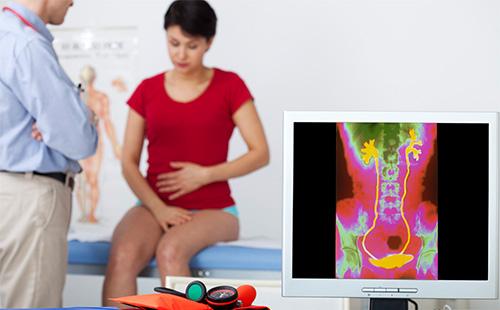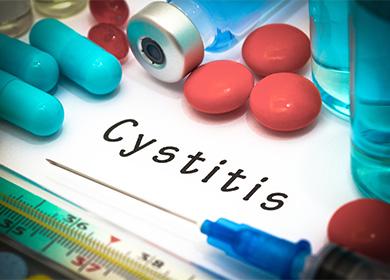The content of the article
In most cases, antibiotics are prescribed without prior bacteriological culture of urine. Therefore, with cystitis, it is recommended to take pharmaceutical preparations with a wide spectrum of action that affect the most common pathogens of infection (E. coli and others). However, before deciding what to drink and how to treat cystitis in women, you still need to consult a doctor with a urologist or therapist.
Why is there a diagnosis
The main cause of cystitis in women is a bacterial flora that enters the ascending path through the urethra. The causative agents of infection are gram-negative bacteria, fungi, less often viruses or protozoa. However, in 80% of cases, the causative agent of the infection is E. coli (Escherichia coli). Staphylococci, Klebsiella, Proteus are detected somewhat less frequently during microbiological examination of urine sediment. That is why the main focus of cystitis therapy is the use of antibacterial agents. The purpose of these drugs is:
- elimination of symptoms of the disease;
- prevention of complications, in particular, involving the kidneys;
- prevention of exacerbations of chronic cystitis.
Treatment of acute inflammation without complications
Therapy of acute cystitis in most cases involves oral administration of antibacterial pharmaceuticals. Antibiotics for cystitis in women are prescribed in a course of no more than three to five days. The advantages of such a short treatment regimen are:
- high therapeutic efficacy;
- good patient adherence to treatment;
- low frequency of side effects;
- low financial costs;
- low risk of developing bacterial resistance to antibiotics.
Suppositories for cystitis in women are not used. In the presence of complicated forms of the disease with the addition of inflammation in the kidneys, the doctor may prescribe injectable forms of the drug. Injections from cystitis in women are selected in accordance with the results of a microbiological study of urine and determination of the sensitivity of microflora to certain antibiotics.
For the treatment of urinary tract infections in non-pregnant women, various groups of antibacterial drugs are used. According to the recommendations of urologists, the following list of antibiotics for cystitis in women has been developed:
- fluoroquinolones (Norfloxacin, Ofloxin, Ciprofloxacin);
- trimethoprim and sulfamethoxazole ("Biseptol»).
Also, as an alternative to cystitis in women, you can drink such antibiotics:
- "Nitrofurantoin" - a course of treatment of seven days;
- «Monural"- once in a dose of 3 g;
- Penicillins or cephalosporins - a five-day course of treatment.
The most effective in acute cystitis are precisely the fluoroquinolones, in clinical studies their high efficiency has been proved.
Norfloxacin
Norfloxacin ("Norbactin», «Nolicin") Is affordable and quite effective drug. Apply it at a dosage of 0.4 g twice a day with an interval of 12 hours.The advantage of this drug is the low risk of genital candidiasis in women.
"Biseptolum"
"Biseptolum" is a combined preparation with a bacteriostatic effect on pathogens of cystitis. It is prescribed in a dosage of 0.96 g twice a day.
The medicine rarely causes side effects, occasionally there are violations of the gastrointestinal tract (GIT) in the form of nausea or thinning of the stool. During treatment with "Biseptolum", insolation should be avoided, products containing para-aminobenzoic acid (greens, tomatoes, carrots, etc.) should also be excluded from the diet.
Nitrofurantoin
Nitrofurantoin ("Furadonin") Is prescribed in a dosage of 100-150 mg up to three times a day. The maximum allowed dose per day is 300 mg.
In some patients, with the use of the drug, side effects may appear in the form of dyspepsia, asthenia, muscle pain. It is not recommended to take this drug simultaneously with fluoroquinolones.
Other uroseptics are also used to treat cystitis: "Nitroxoline», «Furagin», «Furazolidone».
Monural
The medicine acts on most bacteria that cause cystitis. Including it is effective against Escherichia coli, enterobacteria, staphylococci, Klebsiella, etc. The main advantage of this drug is its simplicity and ease of use.
"Monural" is taken once in an amount of 3 g (one sachet). Before use, the powder for the treatment of cystitis must be diluted in 50-100 ml of drinking water and mix thoroughly until a homogeneous suspension is obtained.
Usually this is done a few hours after eating, preferably at night, it is also recommended to empty the bladder first. In severe forms of cystitis, you can take another dose of the drug in a day.
Amoxicillin with clavulanic acid
It is an alternative option in the treatment of uncomplicated urinary tract infections, has a wide spectrum of activity. Prescribe the drug for a five-day course of 250 mg three times a day.
The medicine has a minimum of contraindications and is well tolerated. Of the side effects, digestive system disorders and allergic reactions can be noted.

Medicines for cystitis during pregnancy
Pills for cystitis for women during pregnancy are prescribed only by a doctor. The following drugs are recommended:
- cephalosporins;
- fosfomycin trometamol.
For the treatment of inflammation of the bladder caused by sexually transmitted infections (chlamydia, ureaplasmosis, gonorrhea, trichomoniasis), other broad-spectrum antibiotics are used. For example, such as "Azithromycin" or "Doxycycline". Metronidazole (Trichopolum) has a specific effect on trichomoniasis.
In the treatment of urinary tract infections, non-fluorinated quinolones can be used: nalidixic, oxolinic, pipemidic acids. However, in recent years, they are prescribed relatively rarely, which is associated with the development in bacteria of resistance to these antibacterial drugs. Also, medicines containing chloramphenicol are not prescribed now.
What is prescribed for chronic form
Treatment of chronic cystitis during an exacerbation is carried out with the same drugs as in the case of an acute form of the disease.However, the duration of antibiotic therapy for chronic cystitis is from seven to ten days. Such a long course of treatment is necessary to completely eliminate the bacterial infection.
After stopping the symptoms of exacerbation, if necessary, a course of therapy with uroseptics is prescribed. Also in the treatment of the chronic form of cystitis immunomodulators are used: Lavomax, Uro-Vaxom. During the period of remission, the administration of herbal preparations is indicated in courses of one to two months:
- «Kanefron"(Drops, tablets);
- «Phytolysin"(Capsules, paste from which syrup can be prepared);
- "Monurel" (tablets).
Bladder inflammation refers to a fairly often diagnosed urinary tract pathology in women. For its treatment, effective drugs for cystitis have been developed that allow you to quickly and effectively stop the symptoms of the disease. However, the doctor should still choose the medicine, this allows you to choose the optimal treatment regimen and reduce the frequency of side effects.

